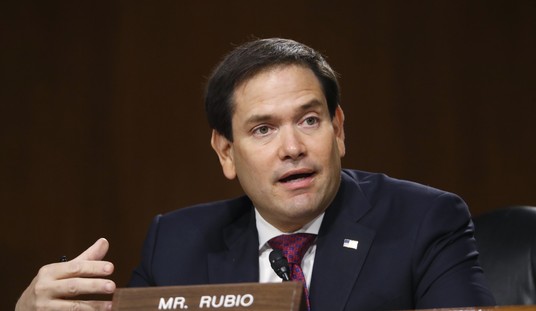
Neville again.
American healthcare aside (“If you like your plan…”), there are some promises that President Obama has kept. Notably, his promise last year to Russia’s Vladimir Putin — accidentally overheard by the entire world, via an open microphone — that once he’d won the 2012 presidential election, he’d have more “flexibility.” He was true to his word. With this September’s Russia-brokered deal over Syria’s chemical weapons, the Obama administration showed flexibility enough to compete with Cirque du Soleil.
Now, just when it seemed that U.S. policy toward Russia could hardly become more flexible without requiring all Americans to dine daily on borscht (or does the Affordable Care Act already include a provision for that?), here comes a story in the New York Times, headlined “A Russian GPS Using U.S. Soil Stirs Spy Fears.” The gist is that the State Department is gung-ho to allow the Russian Space Agency, Roscosmos (which coordinates with Russian military launches), to install on U.S. turf some half a dozen electronic monitor stations for a Russian Global Positioning System. The Times reports that not everyone in the administration thinks this is a great idea. The Pentagon and the Central Intelligence Agency see this plan as a threat to U.S. security: “They fear that these structures could help Russia spy on the United States and improve the precision of Russian weaponry.”
But does that worry the State Department? Not according to the Times, which goes on to provide the following account of the State Department’s rationale:
For the State Department, permitting Russia to build the stations would help mend the Obama administration’s relationship with the government of President Vladimir V. Putin, now at a nadir because of Moscow’s granting asylum to Mr. Snowden and its backing of President Bashar al-Assad of Syria.
Come again? I have read that paragraph over, at least half a dozen times, and it still doesn’t make sense. If the Obama administration’s ties to Putin’s regime are at a low, the reason is not that the U.S. has snubbed or damaged Russia, but that Russia’s Putin has mocked and undermined the U.S. First came Russia’s dalliance with American fugitive Edward Snowden. Then came the aborted showdown over Syria, in which Russia, one of Assad’s chief weapons suppliers, walked away with the jackpot, sending warships into the Mediterranean and wielding diplomacy to translate Assad’s use of chemical weapons into a ticket for the Russian-backed survival of his regime and alarming expansion at U.S. expense of Russian influence in the Middle East. Surely, if the U.S.-Russia relationship is to be improved, it is Russia that owes the U.S. some conciliatory moves. Not the other way round.
And yet, there it is — a report that the State Department hopes to woo Russia by answering the Kremlin’s insults and power-and-influence grabs with an invitation to come on in and set up GPS monitor stations for Roscosmos on U.S. soil; never mind the worries of the CIA and Defense Department. I’m not questioning the reporting in this article; in context there is every reason to believe that the reporters are accurately providing information about State Department policy. It’s the policy itself that makes no sense, at least not if the aim here is to protect U.S. interests and national security.
But there’s a lot going on right now that in terms of actually protecting the U.S. makes zero sense. The endless, amnesiac and oh so flexible “reset” with Russia is consistent with the State Department’s zeal, and for that matter, the president’s, to ensure that no new sanctions are imposed on Iran, lest any flexing of U.S. muscle might wreck the chances for a nuclear deal at the talks now scheduled to resume Nov. 20 in Geneva. Call it pre-existing appeasement. Nor are these independent matters. In Tehran, in Beijing, in Pyongyang and beyond, policy and military elites are reading that article in the New York Times, and drawing their own conclusions about just how thoroughly the U.S. administration will prostrate itself to appease despotic regimes that deride, oppose and threaten America and its allies. This is a policy far removed from the ways of the real world, in which, 26 years ago, to spectacular effect in the cause of peace, President Reagan went to West Berlin and commanded Soviet President Mikhail Gorbachev: “Tear down this wall.” Instead, buying deals for our diplomats today at the cost of proliferating threats tomorrow, we are tripping step by step down the trail of “Peace for our time.”









Join the conversation as a VIP Member